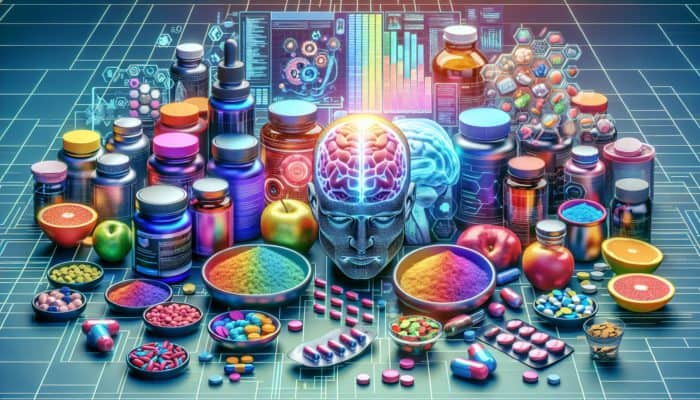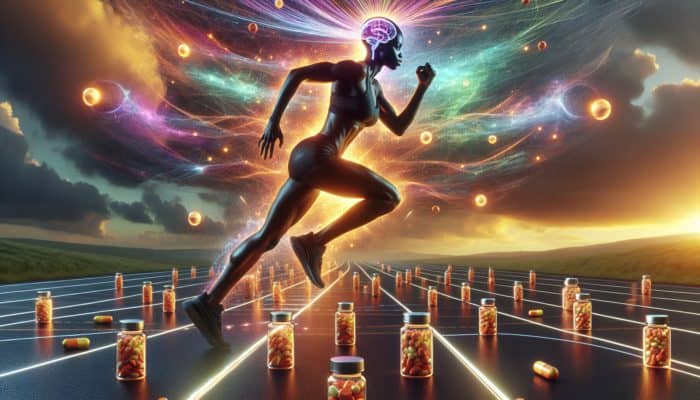Delve into the Impact of Nootropics on Enhancing Cognitive Performance in Athletes
Understanding Nootropics: Enhancing Cognitive Function in Athletes for Optimal Performance

Nootropics represent an intriguing category within sports nutrition, specifically designed to enhance cognitive function and provide athletes with a competitive edge during both training and performance. These substances encompass a wide array of supplements, pharmaceuticals, and functional foods, all aimed at promoting brain health and optimizing cognitive abilities. Their attractiveness stems from the promise of improved mental acuity, which allows athletes to sustain focus and clarity during rigorous training and critical competition. Here are some of the most popular nootropics that athletes commonly utilize:
- Caffeine
- L-Theanine
- Rhodiola Rosea
- Bacopa Monnieri
- Creatine
- Panax Ginseng
- Alpha-GPC
- Phosphatidylserine
These compounds significantly enhance various facets of cognitive function, such as memory retention and effective decision-making, both of which are essential in high-pressure athletic situations.
Exploring the Different Types of Nootropics Available for Athletes
The realm of nootropics is expansive, featuring both synthetic and natural alternatives. While synthetic compounds often produce strong effects, natural extracts offer a gentler, more balanced route to cognitive enhancement. The primary classifications of nootropics include:
- Synthetic Nootropics: Examples like Piracetam and Noopept are specifically designed to enhance cognitive functions.
- Naturally Occurring Nootropics: Such as Ginkgo Biloba and Panax Ginseng, sourced from various plants.
- Amino Acids: Essential compounds like L-Tyrosine and L-Theanine that are vital for neurotransmitter production.
- Vitamins and Minerals: Crucial micronutrients that bolster brain health and enhance cognitive performance.
- Herbal Nootropics: Like Rhodiola Rosea, known for their adaptogenic properties.
Each category operates through distinct mechanisms to enhance cognitive abilities, providing numerous benefits for athletes aiming for peak performance.
Mechanisms of Nootropics: How They Enhance Cognitive Functionality
Nootropics operate by affecting critical neurotransmitter systems and activating neuroprotective mechanisms. They facilitate increased blood flow to the brain and promote neuronal communication, leading to enhanced cognitive capabilities. The primary neurotransmitter systems that nootropics target include:
- Dopaminergic System: Linked to pleasure and reward, enhancing motivation and focus.
- Cholinergic System: Crucial for memory, learning, and attention.
- Serotonergic System: Regulates mood and emotional stability, improving resilience to stress.
- Glutamatergic System: Vital for synaptic plasticity and various cognitive processes.
- Norepinephrine System: Key in attention, arousal, and responses to stress.
By modulating these systems, nootropics enhance cognitive performance significantly, a vital aspect for athletes striving to achieve their utmost potential in their respective sports.
Uncovering the Transformative Advantages of Nootropics for Athletes

Enhancing Focus and Concentration: The Role of Nootropics in Athletic Performance
A notable benefit of nootropics is their ability to significantly enhance focus and concentration, which are essential skills for athletes during training sessions and competitive events. By reducing distractions, nootropics allow athletes to fully immerse themselves in their performance, creating a state of flow that maximizes their potential. For instance, Caffeine is widely acknowledged for its ability to boost alertness and diminish perceived exertion, enabling athletes to perform at elevated intensities.
Furthermore, nootropics like L-Theanine, especially when combined with Caffeine, promote a state of relaxed alertness, delivering a balanced cognitive boost without unwanted side effects. This pairing helps maintain prolonged focus, which is especially advantageous in endurance sports where mental stamina may decline over time. The cognitive edge gained from improved concentration can often be the decisive factor between winning and losing, empowering athletes to execute complex strategies and adapt swiftly to changing conditions.
The Impact of Nootropics on Memory and Learning for Athletes
For athletes, the ongoing acquisition of new techniques, strategies, and routines renders memory retention a crucial element of their training regimen. Nootropics that enhance memory can profoundly elevate an athlete’s capacity to absorb and recall critical information. For example, Bacopa Monnieri is renowned for its memory-boosting properties and is often chosen by students and professionals seeking cognitive enhancements.
In team sports, where tactical plays are constantly evolving, athletes can greatly benefit from nootropics that support rapid learning and retention of intricate information. Additionally, these cognitive enhancers assist athletes in developing muscle memory, making physical movements more instinctive and refined. Thus, the combined benefits of improved memory and learning can lead to enhanced performance and strategic advantages in competitive settings.
Exploring the Effects of Nootropics on Physical Performance Enhancement

While the primary focus of nootropics is cognitive enhancement, many also provide indirect benefits for physical performance. By enhancing mental stamina, reducing fatigue, and boosting motivation, nootropics can contribute to better physical outcomes. For example, nootropics like Rhodiola Rosea have been shown to decrease perceived fatigue, allowing athletes to push past barriers during intense training sessions.
Moreover, creatine is recognized not only for its physical performance benefits but also for its cognitive enhancements during high-intensity workouts. The mental clarity it provides can help athletes reach peak performance by elevating their focus and energy levels. Nootropics that positively affect physical performance include:
- Caffeine
- Creatine
- Rhodiola Rosea
- Panax Ginseng
- Beta-Alanine
- Tyrosine
By incorporating these substances into their training routines, athletes can effectively bridge the gap between mental sharpness and physical capability.
Nootropics and Their Role in Enhancing Reaction Time and Decision-Making Abilities
In the fast-paced world of sports, quick decision-making and fast reactions can drastically influence the outcome of a game. Nootropics play a crucial role in improving an athlete’s reaction time and decision-making skills. By enhancing neural communication and processing speed, nootropics such as Noopept and Alpha-GPC empower athletes to make quick, informed decisions that are essential for success in competitive scenarios.
Athletes engaged in sports that require rapid responses, like basketball or soccer, can gain considerable advantages from the cognitive improvements afforded by nootropics. Faster reaction times enable athletes to react more effectively to opponents and shifting game dynamics. Additionally, the clarity and confidence provided by nootropics can minimize hesitation, allowing athletes to execute plays with accuracy. The cognitive benefits derived from enhanced decision-making can be crucial, enabling athletes to seize opportunities that arise during competition.
Utilizing Nootropics for Stress Reduction and Building Mental Resilience
Athletes frequently face high levels of stress, whether stemming from competitive pressures, training demands, or personal challenges. Nootropics can be powerful allies in alleviating stress and fostering mental resilience, equipping athletes to perform optimally under pressure. Substances like Ashwagandha and L-Theanine are well-known for their capacity to modulate stress responses, promoting a sense of calm and focus.
By mitigating the physiological impacts of stress, nootropics enable athletes to maintain composure and mental clarity during critical moments. This mental resilience is especially vital in sports where performance anxiety can lead to unsatisfactory outcomes. Nootropics facilitate emotional regulation, empowering athletes to recover from setbacks and maintain a positive mindset throughout their training and competitive experiences.
Insights from Experts on Nootropics in Sports Nutrition
Expert Recommendations on Nootropic Usage for Athletes
Professionals in the field of sports nutrition are increasingly investigating nootropics, weighing both their potential benefits and associated risks. The general consensus among experts is that, when appropriately utilized, nootropics can offer athletes substantial cognitive advantages. Real-world applications are evident in professional sports, where athletes have reported improved focus and enhanced reaction times, thanks to carefully tailored nootropic regimens.
For instance, elite athletes in sports like football and tennis frequently incorporate nootropics to navigate the cognitive demands of their disciplines. Coaches have observed that athletes using nootropics demonstrate better understanding of complex strategies and sustain concentration throughout training sessions. This highlights the practical benefits of nootropics, proving that they are not merely theoretical enhancements but effective tools for genuine performance improvement.
Guidelines for Athletes to Safely Incorporate Nootropics into Their Training Regimens
Safety is paramount when considering the addition of nootropics to athletic practices. Athletes should always consult with healthcare professionals or sports nutritionists before introducing nootropics into their routines. Personalized guidance ensures that athletes choose substances that align with their specific needs and performance objectives. Awareness of potential side effects is critical, as individual responses to nootropics can vary widely.
Gradually introducing nootropic compounds, starting with lower doses, allows athletes to assess tolerance and effectiveness without experiencing negative side effects. Additionally, sourcing nootropics from reputable suppliers is essential to guarantee quality and safety. Responsible usage involves adhering to recommended dosages and avoiding combinations that could lead to overstimulation or dependency.
Ethical Considerations Regarding Nootropic Use in Athletics
The integration of nootropics into sports raises significant ethical issues concerning fairness and competition. As cognitive enhancers become more prevalent, discussions surrounding their use intensify, particularly regarding accessibility and the potential for creating an uneven playing field. Athletes must thoughtfully consider the implications of nootropic use in relation to the spirit of competition, reflecting on how their usage may affect their integrity and the integrity of their sport.
Furthermore, regulatory bodies across various sports are beginning to assess the classification of nootropics, determining whether they should be considered performance-enhancing substances or remain categorized as dietary supplements. Ethical considerations extend beyond the individual athlete, influencing team dynamics and the broader culture of sports. Athletes must navigate these complexities as they seek cognitive enhancements while adhering to their values and the principles of fair play.
Investigating Nootropics in the Battle Against Mental Fatigue
Addressing Mental Fatigue in Athletes with Nootropics
Mental fatigue can significantly impair an athlete’s performance, impacting focus, decision-making, and overall energy levels. Nootropics combat mental fatigue by enhancing neurotransmitter activity and promoting neuroprotection. Substances like Rhodiola Rosea and Panax Ginseng are particularly effective in reducing the effects of mental fatigue, allowing athletes to sustain cognitive function during extended training sessions or competitions.
The ability to maintain high energy levels and mental clarity is essential for athletes competing in demanding sports. Nootropics can help stave off feelings of exhaustion and sustain motivation, enabling athletes to tackle challenges more effectively. By targeting the underlying mechanisms of mental fatigue, nootropics empower athletes to train harder and perform better, ultimately leading to improved overall results.
Identifying the Most Effective Nootropics for Enhancing Mental Stamina
Some nootropics are especially recognized for their ability to enhance mental stamina, allowing athletes to preserve cognitive function during high-intensity activities. Substances like Caffeine and L-Theanine work synergistically to boost alertness and concentration while minimizing jitters. Additionally, the robust nootropic Bacopa Monnieri has been shown to support memory retention and cognitive endurance, making it an excellent choice for athletes engaged in lengthy training sessions.
The leading nootropics for enhancing mental stamina include:
- Caffeine
- L-Theanine
- Bacopa Monnieri
- Rhodiola Rosea
- Panax Ginseng
- Tyrosine
These compounds strengthen cognitive resilience, enabling athletes to remain sharp and focused even as physical demands increase.
Preventing Burnout in Athletes with Nootropics
Burnout is a significant concern for athletes, particularly those who endure rigorous training schedules and intense competitive pressures. Nootropics can play a crucial role in preventing burnout by enhancing cognitive function and emotional well-being. By improving focus, alleviating anxiety, and bolstering stress management, nootropics support athletes in maintaining motivation during challenging periods.
Athletes who efficiently manage their cognitive workload are less likely to suffer from mental exhaustion, which often leads to burnout. By integrating nootropics into a well-rounded training regimen, athletes can receive the support necessary to handle demanding schedules while protecting their mental health. Ultimately, this approach can promote sustained performance and a healthier relationship with their sport.
Choosing the Right Nootropics for Combatting Mental Fatigue
Selecting the most appropriate nootropics for addressing mental fatigue requires a thorough evaluation of individual needs, performance goals, and potential side effects. Athletes should begin by pinpointing specific challenges related to focus, memory, and fatigue levels. Consulting with healthcare professionals can provide valuable insights into which substances may be most beneficial.
It’s important to consider the synergistic effects of nootropic combinations, as some substances may work more effectively when paired with others. For instance, combining L-Theanine with Caffeine can enhance alertness while mitigating jitteriness. Additionally, athletes should remain mindful of their overall health, ensuring that their nootropic selections align with their dietary and lifestyle preferences. By customizing their approach to nootropics, athletes can effectively combat mental fatigue and optimize their cognitive performance.
The Interaction of Nootropics and Nutrition in Athletic Performance
How Nootropics and Nutritional Choices Work Together for Enhanced Performance
An athlete’s diet can greatly influence the effectiveness of specific nutrients, potentially amplifying or inhibiting their cognitive effects. Diets rich in omega-3 fatty acids, antioxidants, and B vitamins can support overall brain health, which may enhance the benefits of nootropics. Conversely, diets high in sugar or heavily processed foods can detract from cognitive function and diminish some advantages of nootropic supplementation.
Athletes should adopt a holistic approach that combines nutrition with their nootropic regimen. By ensuring a balanced diet, athletes can amplify the cognitive benefits provided by nootropics, leading to improved performance outcomes. Harmonizing dietary choices with nootropic use allows athletes to cultivate an environment that fosters optimal cognitive function and athletic performance.
Foods That Complement Nootropic Use for Optimal Cognitive Results
Incorporating specific foods into an athlete’s diet can optimize the benefits of nootropics and enhance cognitive function. Foods rich in antioxidants, healthy fats, and essential vitamins and minerals are key contributors to brain health. Nutrient-dense options like leafy greens, fatty fish, nuts, and berries can amplify the effects of nootropics, creating a synergistic relationship that enhances cognitive performance.
Athletes should aim to include foods that complement their nootropic choices, such as:
- Fatty fish (rich in omega-3 fatty acids)
- Nuts and seeds (high in antioxidants)
- Leafy greens (abundant in vitamins)
- Whole grains (providing sustained energy)
- Berries (loaded with flavonoids)
- Dark chocolate (enhancing mood and cognition)
By prioritizing a diet that promotes brain health, athletes can maximize the cognitive advantages offered by their nootropic supplements.
Understanding the Role of Nootropics in Relation to Nutritional Supplements for Athletes
While nootropics can enhance cognitive function, they should not replace essential nutritional supplements crucial for overall health and athletic performance. Nutritional supplements, including protein powders, vitamins, and minerals, are vital in maintaining physical health, aiding recovery, and boosting energy levels. Nootropics serve as cognitive enhancers rather than substitutes for fundamental nutritional needs.
Athletes must adopt a comprehensive approach to nutrition that integrates both nootropics and necessary dietary supplements. Each element contributes uniquely to performance support, and neglecting nutrition in favor of cognitive enhancement can lead to imbalances and decreased performance. A well-rounded regimen that combines nootropics with traditional nutritional supplements enables athletes to excel both physically and mentally.
Meal Timing: Its Impact on Nootropic Effectiveness
The timing of meals can significantly affect the absorption and effectiveness of nootropics. Consuming nootropics on an empty stomach may enhance their absorption, while pairing them with certain foods can either amplify or reduce their effects. For example, fats can facilitate the absorption of fat-soluble nootropics, while high-fiber foods may slow down absorption rates.
Athletes should be mindful of their meal schedules when incorporating nootropics into their routines. Proper timing not only maximizes the efficacy of nootropic supplementation but also aligns cognitive performance with training and competition schedules. Understanding individual responses to meal timing can assist athletes in optimizing their cognitive enhancement strategies for peak performance.
Frequently Asked Questions About Nootropics
What Are Nootropics and What Is Their Primary Purpose?
Nootropics are substances designed to enhance cognitive function, encompassing various supplements, drugs, and functional foods aimed at improving mental performance.
In What Ways Do Nootropics Improve Cognitive Function in Athletes?
Nootropics interact with neurotransmitter systems, increase blood flow to the brain, and protect neurons, leading to enhanced cognitive abilities.
Can Nootropics Positively Influence Physical Performance?
Indeed, certain nootropics can indirectly enhance physical performance by boosting mental stamina, reducing fatigue, and enhancing focus.
Are Nootropics Safe for Athletes to Use?
Safety varies based on individual reactions and proper usage; athletes should consult healthcare professionals prior to using nootropics.
What Are the Most Effective Nootropics for Stress Relief?
Effective nootropics for stress relief include L-Theanine, Ashwagandha, and Rhodiola Rosea, known for their calming effects.
Can Nootropics Help Athletes Prevent Burnout?
Nootropics may assist in preventing burnout by enhancing cognitive function and emotional resilience, thereby reducing the risk of mental fatigue.
What Risks Are Associated with Nootropic Use?
Potential risks include overstimulation, anxiety, and dependency, particularly when misused or consumed in excessive dosages.
How Can Athletes Select the Right Nootropics for Their Needs?
Athletes should assess their specific needs, consult professionals, and consider potential side effects when choosing nootropics.
Do Nootropics Replace the Necessity for Nutritional Supplements?
No, nootropics should complement rather than substitute essential nutritional supplements necessary for overall health and performance.
How Does Meal Timing Affect Nootropic Effectiveness?
Meal timing can influence the absorption and effectiveness of nootropics; consuming them with certain foods can either enhance or diminish their effects.
Connect with Us on Facebook!
The Article Nootropics in Sports Nutrition: Enhancing Athletic Performance appeared first on https://athleticsupplement.com
The Article Nootropics Boosting Athletic Performance in Sports Nutrition Was Found On https://limitsofstrategy.com

